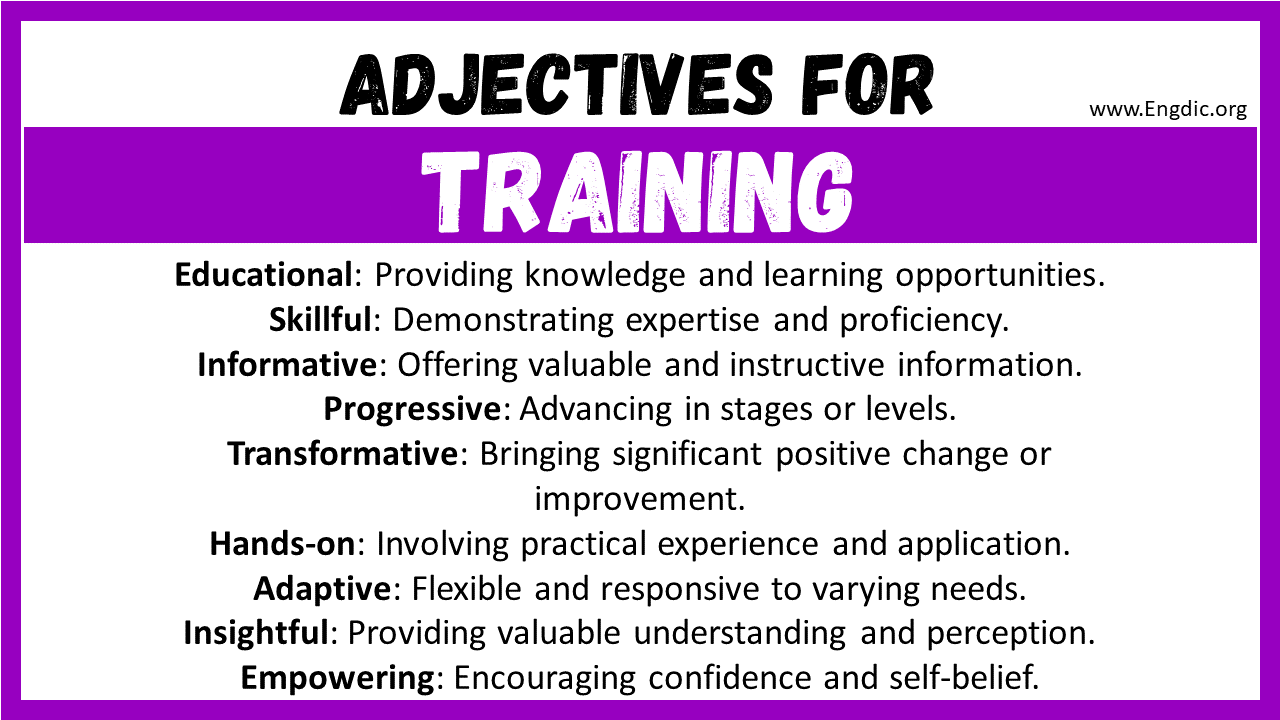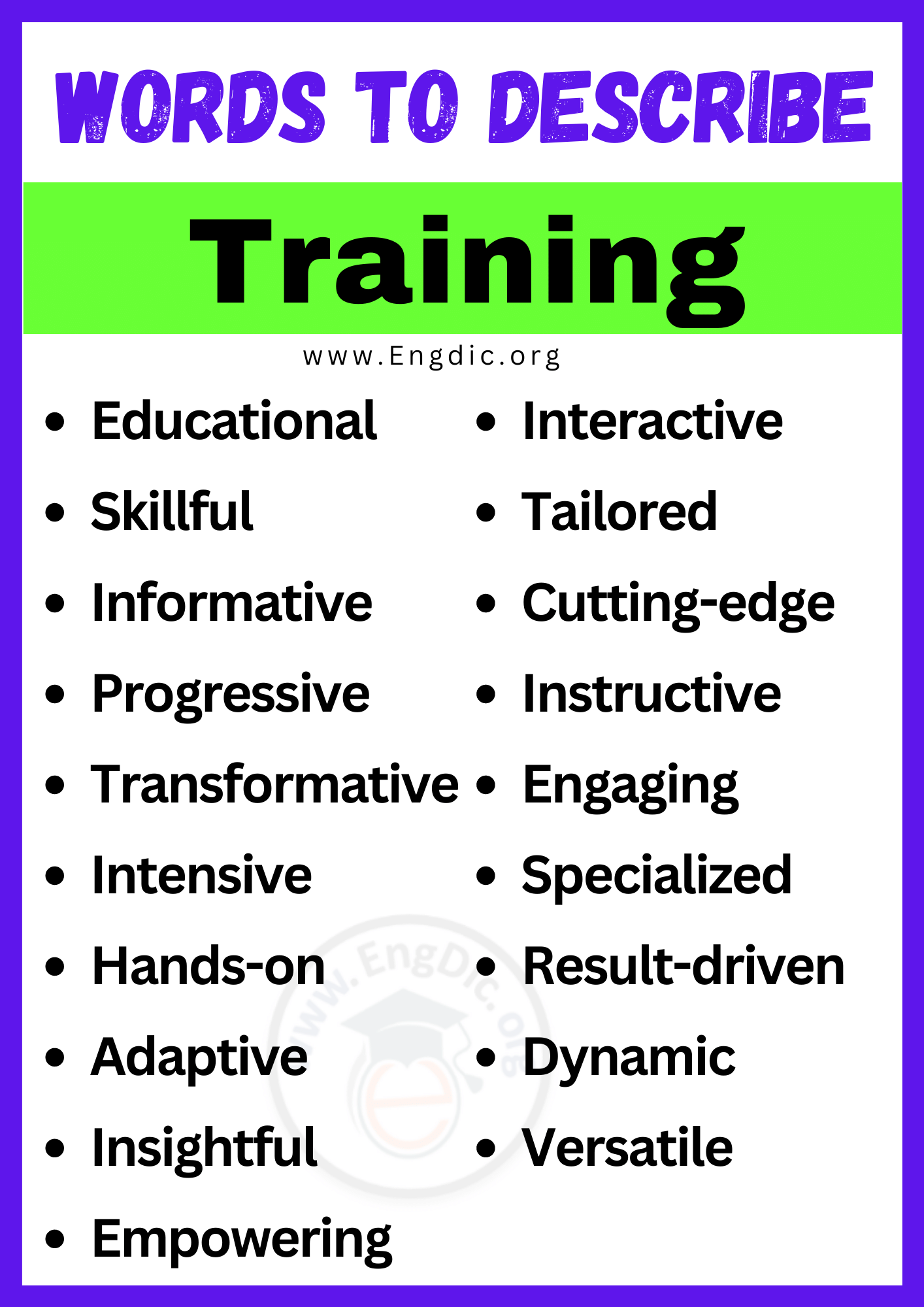In the realm of personal and professional development, training serves as a fundamental cornerstone. It refers to the process of acquiring knowledge, skills, and expertise in a particular field. However, the impact of training goes far beyond the simple transfer of information.
Words have the ability to encapsulate the essence of these transformative experiences, enabling us to articulate the nuances of our growth journey. In this blog post, we will delve into the significance of words to describe training, unveiling their potential to inspire, motivate, and empower individuals in their quest for improvement.
Adjectives for Training
Here are the 20 Most Popular adjectives for training:
- Educational
- Skillful
- Informative
- Progressive
- Transformative
- Intensive
- Hands-on
- Adaptive
- Insightful
- Empowering
- Interactive
- Tailored
- Cutting-edge
- Instructive
- Engaging
- Specialized
- Result-driven
- Comprehensive
- Dynamic
- Versatile
Adjectives for Training Session:
- Interactive
- Engaging
- Intensive
- Productive
- Collaborative
- Informative
- Dynamic
- Practical
- Stimulating
- Well-structured
Adjectives for Training Program:
- Comprehensive
- Customized
- Transformative
- Progressive
- In-depth
- Versatile
- Specialized
- Result-oriented
- Holistic
- Cutting-edge
Adjectives for Training Objectives:
- Clear
- Attainable
- Measurable
- Relevant
- Time-bound
- Ambitious
- Realistic
- Aligned
- Specific
- Empowering
Adjectives for Training Module:
- Modular
- Sequential
- Concise
- Practical
- Interactive
- Targeted
- Comprehensive
- User-friendly
- Resourceful
- Self-paced
Words to Describe Training with Meanings
- Educational: Providing knowledge and learning opportunities.
- Skillful: Demonstrating expertise and proficiency.
- Informative: Offering valuable and instructive information.
- Progressive: Advancing in stages or levels.
- Transformative: Bringing significant positive change or improvement.
- Intensive: Focused and concentrated in effort.
- Hands-on: Involving practical experience and application.
- Adaptive: Flexible and responsive to varying needs.
- Insightful: Providing valuable understanding and perception.
- Empowering: Encouraging confidence and self-belief.
- Interactive: Involving active participation and engagement.
- Tailored: Customized to specific requirements or individuals.
- Cutting-edge: Incorporating the latest and innovative methods.
- Instructive: Offering clear and useful guidance.
- Engaging: Holding attention and interest effectively.
- Specialized: Focused on a particular area or expertise.
- Result-driven: Aimed at achieving specific outcomes.
- Comprehensive: Covering a wide range of topics.
- Dynamic: Energetic and constantly evolving.
- Versatile: Adaptable for various contexts or purposes.
Example Sentences for Training Adjectives
- The educational workshop enhanced our knowledge.
- She is a skillful communicator in presentations.
- The seminar provided informative insights on sales.
- The progressive training improved their performance gradually.
- The workshop brought transformative changes in him.
- The boot camp was intensive but rewarding.
- Students received hands-on experience in the lab.
- The adaptive training program suited all participants.
- His speeches are always insightful and inspiring.
- The motivational speaker delivered an empowering message.
- The interactive training session engaged everyone.
- The course was tailored to their specific needs.
- They implemented a cutting-edge approach to teaching.
- The teacher’s instructions were clear and instructive.
- The event’s activities were engaging and interactive.
- He is known for his specialized knowledge in finance.
- The project’s success was due to its result-driven strategy.
- The comprehensive course covered various aspects of marketing.
- The startup industry is always dynamic and competitive.
- The tool is versatile and can be used for multiple tasks.
Explore More Words:
FAQ’s
How to describe training in writing?
Training can be described in writing as the process of imparting knowledge, skills, and expertise to individuals or groups to enhance their performance in specific areas.
What is training and its steps?
Training is a systematic process of acquiring knowledge and developing skills. Its steps typically include needs assessment, design, delivery, evaluation, and feedback.
What is a method of training?
One method of training is the “on-the-job training,” where individuals learn and develop skills while performing their actual work tasks under the guidance of experienced colleagues.








